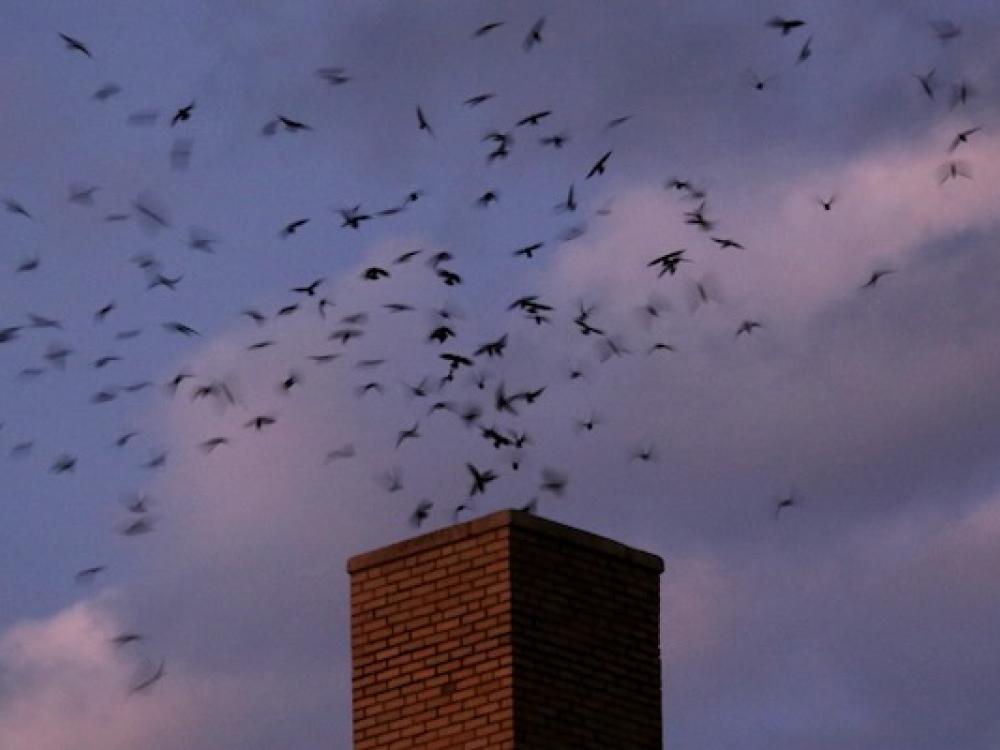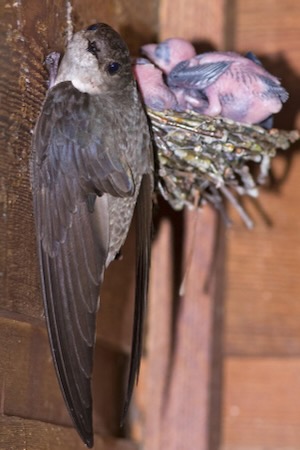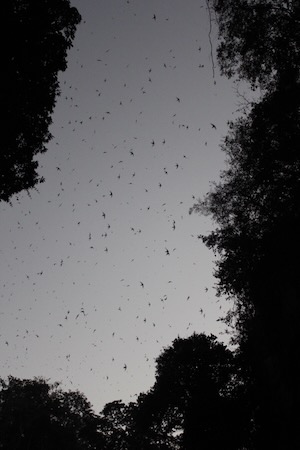
Trinity River Audubon Center hosts Swift Night Out on Sept. 7. The event is free. Courtesy of Ben Cvengros.
Aug. 25, 2023
A North Texas Nature Center invites the public to enjoy bird aerial acrobatics up close while advancing science.
Swift Night Out will be held on Thursday, Sept. 7, at 7:15 p.m. at the Trinity River Audubon Center, at 6500 Great Trinity Forest Way in Dallas.
The nature center’s rare nighttime event features an opportunity to witness chimney swifts and other bird species as they take to the wing.
Participants will also learn tips on bird species identification and help count chimney swifts, purple martins, barn swallows and other species that emerge, thereby helping researchers gain a more accurate estimation of the bird population in North Texas.
“The goal for Swift Night Out is for participants to come and learn about the unique biology and lifecycle of this really cool bird — the chimney swift — and also participate in a community science initiative that will help us record as many species as we can,” says Jake Poinsett, programs manager for the center.
Chimney swifts are a bird that is typically undercounted in bird surveys, according to Poinsett.
“We don't fully understand where they're coming and going because they have such a large range in their migration, he said. “This will help us better understand the bird population, and when they are migrating south in the fall migration. They congregate in large groups, so this should be a fun spectacle.”
SWIFT DECLINE
Poinsett says like almost every other bird species in North America, chimney swifts have sharply declined in number over the past six decades. Since the 1960s, roughly 67 percent of the chimney swift population has disappeared as the species is especially vulnerable to habitat loss
 A nesting chimney swift. Photo courtesy of Trinity River Audubon Center.
A nesting chimney swift. Photo courtesy of Trinity River Audubon Center.
Chimney swifts originally roosted in the cavities of dead trees throughout their North American range. But as land was cleared to make way for farmland and ever-sprawling cities and suburbs, the swifts were forced to adapt to live in chimneys. Modern chimney construction practices, however, preclude entry from birds and rodents into chimneys, and thus the chimney swift is now facing the disappearance of its secondary habitat.
Chimney swifts originally roosted in the cavities of dead trees throughout their North American range. As land was cleared, the swifts adapted to living in chimneys. Now as modern chimney construction is designed to keep critters out, chimney swifts now face the disappearance of their secondary habitat.
The decline of chimney swifts presents the loss of a major ecosystem service that humans rely on, said Poinsett.
“They are insectivores that hunt on the wing. They spend most of their life in the air. They're just constantly flying around and gobbling up aerial insects, including mosquitoes and crop-destroying pests,” Poinsett says. “They can eat as many as 12,000 insects in a single day, so the ecosystem service that they provide is extremely valuable.”
The bird count will be one of many occurring on the same night throughout the country. The results will be added to a database for researchers to use to estimate bird species populations. Poinsett says such information gathered by citizen scientists is highly beneficial to wildlife biologists.
This is the first year that the Trinity River Audubon Center will participate in the bird count.
Poinsett says that a special chimney-like structure constructed by the Texas Master Naturalists at the center attracts a large number of chimney swifts, so participants in the evening bird count will have plenty of opportunity to see the birds circling in the air, diving, ascending and altogether demonstrating their advanced flight skills while they feed.
The fall bird migration has already begun in North America. Texas experiences a peak from late September through October, when the state is a major part of the bird migration pathway. An estimated two billion birds fly through on their way down to the Gulf Coast, Mexico and Central and South America for the winter. The fall migration is extended over many months, whereas spring migration is more compact.
 NIGHT OUT
NIGHT OUT
Chimney swifts on the wing. Photo by Richard Schwarz.
Trinity River Audubon Center assistant Keegan Hassett says the Swift Night Out event is a rare chance for the public to experience the nature center during the evening.
“This program is just one of the many programs that we aim to be both approachable and seasonable,” she says. “We’re always thinking in terms of how can we make this accessible for our community and how can we keep it on topic and help folks as the seasons progress better understand our place in the ecosystem.”
Admission to the event is free. Space is limited, so anyone who wants to participate must reserve tickets through the center's website.
Poinsett advises participants to bring their own lawn chairs, binoculars and insect repellent for what he says should be an enlightening night out.
“It will be people just hanging out in their lawn chairs with some binoculars and just geeking out over birds,” he says.
Swift Night Out
About: Help the Trinity River Audubon Center count migrating chimney swifts and other birds as they travel south.
When: Sept. 7, 2023, 7:15 p.m. to 8:15 p.m
Where: Trinity River Audubon Center, at 6500 Great Trinity Forest Way in Dallas
Cost: Free. Register at the website link below. Bring your own lawn chairs, binoculars and insect repellent.
RELATED ARTICLES
Birds in steep decline since 1970s
Stay up to date on everything green in North Texas, including the latest news and events! Sign up for the weekly Green Source DFW Newsletter! Follow us on Facebook,Twitter and Instagram. Also check out our podcast The Texas Green Report, available on your favorite podcast app.









